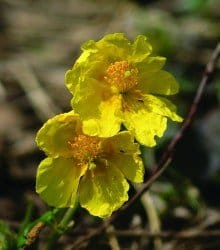Dorset Wildlife Trust (DWT) is launching a new conservation project to help declining wildflowers in the county. The wildlife conservation charity is aiming to raise £20,000 to ensure this vital work can go ahead.
Plants provide an essential part of our ecosystem and a whole host of wildlife is dependent on the flowers found in traditionally managed wildflower meadows, including butterflies, bumblebees, frogs and birds. However, Dorset has lost over 20 hectares of plant-rich wildlife sites in the last 3 years alone, leading to concern that our countryside is insufficient to maintain wildflower populations long term.
DWT’s Director of Conservation, Imogen Davenport said, “Changes in grassland management over the last century have altered conditions leading to the loss of wildflower habitat, both in Dorset and the UK. The consequences of understandable aims to increase food production such as re-seeding of meadows with quick-growing grasses, increased use of fertiliser and cutting meadows earlier in the year have all contributed to the disappearance of wildflowers. On the flip side, many grasslands too difficult to manage efficiently have been lost to scrub. If we want to maintain places where wildflowers thrive in the county, it does take special efforts by landowners, and we want to help make this possible through the Dorset Wildflower Project”
The publication of the England’s Plant Red List* in 2014 revealed that many plants in the UK are declining at a worrying pace. The study found that 1 in 5 plants are classed as under threat, with a 20-30% drop in their population. This includes well-known flowers such as the ragged-Robin, harebell, quaking grass, common rock-rose and field scabious.
Restoring and connecting the surviving plant-rich sites and creating new sites are essential to help stop this decline. 100% of all donations will go straight to the Dorset Wildflower Project and will be used to:
- Survey key sites across the county, recording threatened species and assessing the best opportunities for restoration;
- Introduce threatened wildflower species on target sites by spreading green hay or wildflower seeds collected from the best wildflower sites;
- Engage with the public to raise awareness of the plight of wildflowers and involve them in identifying threatened species in the countryside;
- Follow-up with the owners and managers of vulnerable wildlife sites to advise on how best to manage the land and support key plant species;
- Improve the control of livestock grazing, which is vital for maintaining plant-rich grassland;
- Work to control scrub and bracken to prevent encroachment onto plant-rich grasslands;
To find out more, and donate to the Dorset Wildflowers Project, visit www.dorsetwildlifetrust.org.uk/wildflowers or phone 01305 264620.












